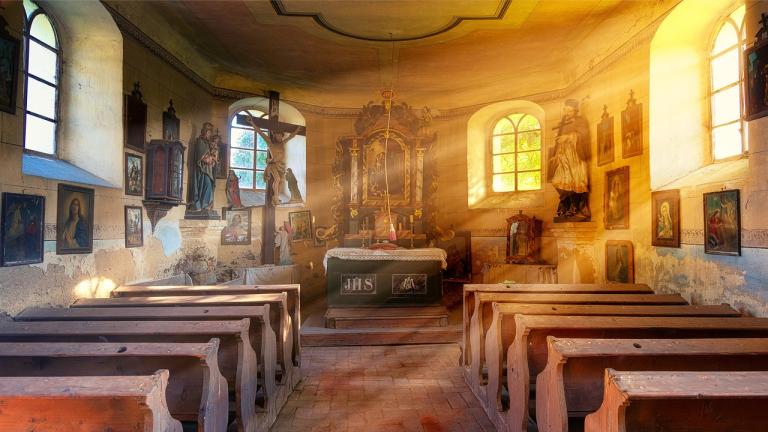
Is there anything more quintessential to religious faith than prayer? Regardless of the faith tradition, prayer is an essential component of what it means to be a believer in God.
Nevertheless, prayer can be, and frequently is, defined in several ways. At its most basic, prayer manifests one’s relationship with God. However, since one’s relationship with God is frequently multifaceted, prayer too often has varying aspects associated with it. In this paper, I will examine four components that comprise prayer. An acronym for these components is ACTS: adoration, confession, thanksgiving, and supplication.
Adoration
To understand adoration, we must understand the object of adoration, which is God. Unfortunately, understanding God is, in principle, impossible for human beings. Owing, however, to Divine Revelation and two thousand years of Catholic theology, we can attribute certain traits to God. We can speak of God as the source of creation, infinitely perfect, and the highest good. Because of this, and more, God alone is owed supreme honor.
The honor and praise owed to God alone is called adoration. Therefore, adoration can be defined as an act of religion by which God is recognized as alone worthy of supreme honor. It is at once an act of mind and will, expressing itself in certain types of prayers, postures of praise, and acts of reverence and sacrifice. In what form do these prayers, praise, and acts of reverence and sacrifice take?
The apex of adoration is the Eucharist. Here, the prayers, praise, reverence, and sacrifice that comprise adoration are present. In addition, the Catholic Church recognizes the great value of Eucharistic adoration. While it is true that one can pray anywhere, the Eucharistic adoration differs from other forms of prayer in one significant way. Because Christ’s body, blood, soul, and divinity are substantially present in the Eucharist, Eucharistic adoration is particularly intimate and personal.
Confession
The necessity to confess one’s sins is at the heart of the New Testament. If one wanted a minimalist summary of the New Testament, it would be “repent and believe the good news.” (Mark 1:15). To be sure, repentance is not the same as confession. Repentance requires metanoia – a spiritual and transformative change. However, repentance can not take place without confession.
In the Catholic faith, confession is a process. The first step is an examination of conscience. This involves prayerfully examining one’s deeds, words, and thoughts to identify what sins one has committed. An example of this process would be a close reading of the Ten Commandments and comparing the Commandments against one’s own actions.
The examination of conscience is typically done in preparation for partaking of the sacrament of reconciliation. However, it can also be done as a stand-alone practice in addition to reciting the Act of Contrition.
Thanksgiving
There are numerous reasons why Catholicism asserts that God is owed our gratitude. I will briefly touch on five of them.
The first three reasons are similar in that they are, at least partially, philosophical. First, God is the efficient cause of creation. Everything that exists ultimately owes its existence to God. It is altogether proper to give thanks to that which has caused one to exist.
The second reason requires understanding that everything that exists is an effect. Nothing in creation is the cause of its own existence. Since an effect can only operate so long as the cause sustains it, gratitude is owed to God for maintaining our existence.
The third reason continues the arc of the first two reasons. God is that for which human beings are made. The highest good that humans can attain is communion with God. Saint Augustine memorably stated the concept this way, “You have made us for yourself O Lord, and our heart is restless until it rests in you.”
The fourth reason is that God is the objective standard of good and truth. This is a matter of natural law, positive (man-made) law, and ethics. It is a subject deserving of more treatment than I can provide here. Suffice it to say that the existence of objective morality is reliant upon God.
The last reason for giving thanks to God is, to put it simply, that Jesus Christ is the sole source of our salvation. This reason involves soteriology and, again, is beyond the scope of this essay.
The mechanism by which Catholics give thanks to God is, of course, prayer. It is telling that a translation of the word Eucharist is thanksgiving. In and through the Mass, Catholics profess the proper gratitude owed to God.
Supplication
The last component of ACTS is supplication. When one thinks of prayer, it is frequently in the context of supplication.
Within the context of prayer, supplication is more commonly referred to as petitionary prayer. It is an act by which one seeks some perceived good from God. However, one encounters a dilemma. If God is good and omniscient, why do we need to pray at all? After all, Christ tells us that God the Father knows our needs before we even pray. (See Matthew 6:8). There are several answers to this dilemma.
Prayer properly orders the creature (human beings) to their creator (God). Moreover, Scripture indicates that while God knows our needs, He waits for us to ask. “Ask, and it will be given to you; seek, and you will find; knock, and the door will be opened to you.” (Matthew 7:7). Finally, prayer, particularly petitionary prayer, evidences the trust in God that is at the heart of faith.
The sin qua non of the Catholic faith is prayer. In this article, I have sought to examine four aspects of prayer: adoration, confession, thanksgiving, and supplication.













